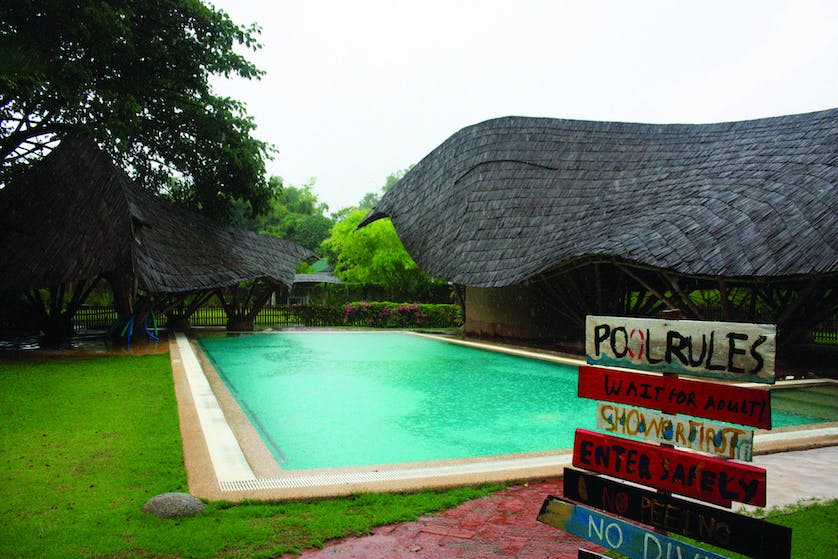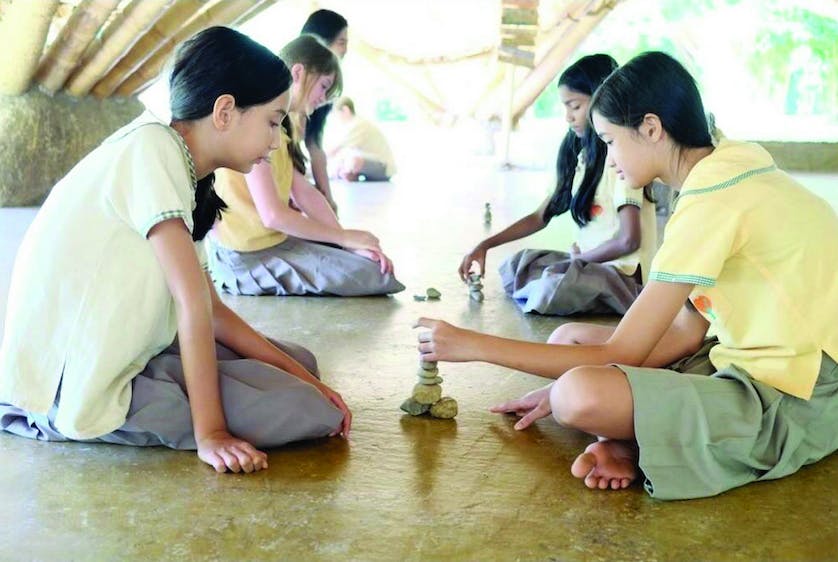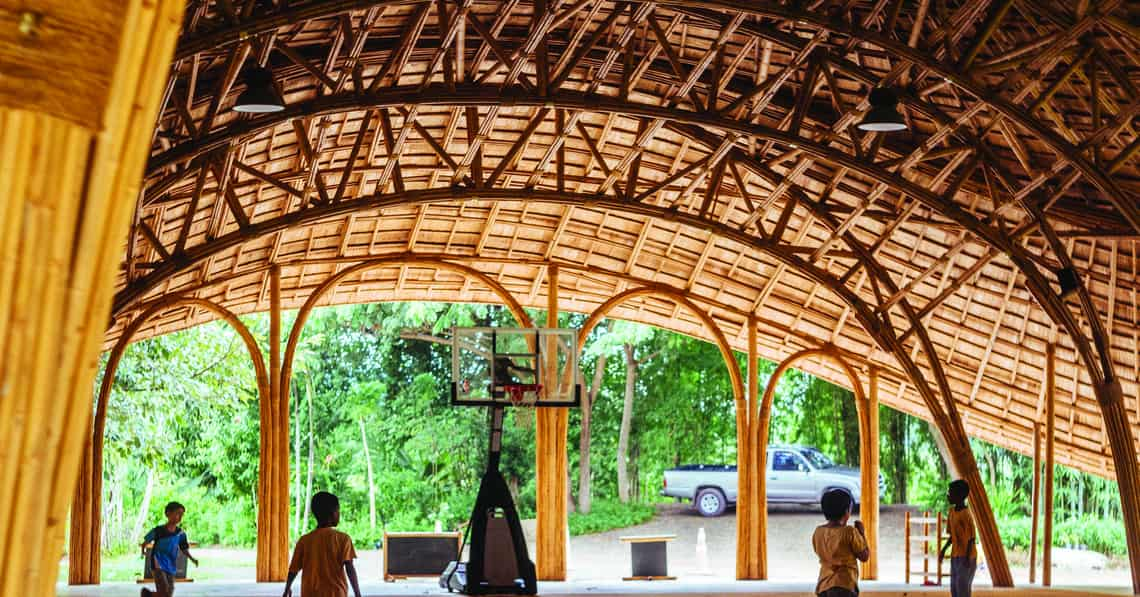A long driveway circled by a tunnel of bamboo leads the way towards Panyaden International School. As the tunnel ends, it opens up to reveal a school which looks as though it has grown out of the ground on which it stands. As children of all ages pour out of their school rooms into the arms of adoring parents, their giggles and grins turn the day sunny. Children, from toddler to twelve, were running around barefoot, uniforms askew, some heading to the award-winning bamboo sports hall for after school activities, others to their parents’ vehicles, chattering about their day.
“We all go barefoot here,” smiled Yodphet Sudsawad, Panyaden International School’s founder as she pointed out a simple practice that embodies so much of the school’s approach and philosophy. “It instils a connection to nature which we find very important to a child’s development. It is good for the feet as walking on the grass massages the sole, it helps children to learn to watch where they are going and to be mindful as well as helping them to overcome any fear they may have of nature. If they step on some sharp pebbles, then so be it; they will learn to be more careful in the future.”
Panyaden opened seven years ago to much acclaim and curiosity. Yodphet’s stated aim was a dream and desire, “to see the children in my school grow not only physically but mentally and spiritually, to become leaders and innovators who are able to help our society and to be an inspiration for the world they live in.” To that end, while the school has adopted the British International Primary Curriculum (IPC), she has also infused the entire school, from architecture through to curriculum and extra-curricular activities, with core values based on Buddhist philosophy. Yodphet’s husband, Dr. Markus Roselieb, a then-amateur and now successful architect, was tasked with building the school. He used natural earth, clay, stones and bamboo to create an internationally acclaimed cluster of structures on 14 rai of land to echo and complement his wife’s philosophy for the school — green materials, natural airflow and ventilation for cooling, low carbon footprint and environmentally mindful.

“We offer a value-based education,” explained Yodphet of Panyaden’s philosophy. “This means that universal values, or what we call 12 Wise Habits, such as perseverance, patience and compassion, are introduced and constantly reinforced through the use of experience. Our children are encouraged to experience consequences naturally. So if a child doesn’t want to study in class, that is OK, but then they will miss out on playtime because they will have to complete their work during lunch break or recess. We don’t force them we allow them to learn through their own experiences and through role playing or discussions. This way they will learn about cause and effect. This will apply later in life when they encounter things such as peer pressure. Our kids will understand consequence and make their own decisions about smoking, drinking or drugs as well as any and all future life challenges. We put a lot of expectations on our teachers who work very hard to instil these values into every aspect of school life. We also don’t praise beauty or smartness of talent, but effort, perseverance and development of the 12 Wise Habits.”
Panyaden’s approach to education is unique, yet also conforms to a growing trend to educate holistically, rather than focus solely on academic rigour. The school has regular meditation sessions in-school for its students as well as retreats for its teachers. The school’s spiritual advisor, Venerable Ajarn Jayasaro regularly visits the school to give talks, meet with and advise students, teachers and parents. Guest monks and nuns also give talks and lead Buddhist events throughout the year. The school’s student body comprises over two dozen nationalities and culture is also an important aspect in every day school life with students studying in both Thai and English with Thai and Lanna cultures and traditions also being taught and applied.
“When we teach maths, it isn’t just maths, we help our students to understand perseverance,” explained Yodphet. “When they are hungry, we teach them about patience; when someone is bullied we teach both parties tolerance, responsibility, compassion and truthfulness. Our students learn to think and discuss issues so that they can apply their lessons to all aspects of life. Our teachers live and breathe our philosophy, that way they can apply it in all situations.”
Panyaden’s philosophy permeates not just the curriculum and the architecture, but also the school’s extra-curricular activities. The school has its own vegetable garden and paddy field, tended to by the students. There are regular field-trips off-campus such as tree planting projects as well as on-campus activities after hours. It is important to Yodphet to involve not just the students and teachers in the school’s activities, but also to engage parents, so that all parties can work towards the positive development of the students.
“Our kids learn to find happiness from within,” continued Yodphet. “They learn that only they are truly responsible for their happiness and that any difficulty and challenge faced is merely a lesson from which to gain strength so that they can see that the only person they need to better is themselves. This helps them to create their own positive teaching mechanism so that they are able to face anything thrown their way.”
Yodphet’s stated aim for the school was never about academic excellence, instead she has been true to her original philosophy, focusing efforts and priorities on values. Yet, a recent 2016 assessment programme, Measuring Academic Progress (MAP), which is used by thousands of schools in the US as well as over 550 international schools in 160 countries, recently revealed that in English and maths, Panyaden’s students are equalling or outperforming other international schools in Thailand as well as schools across the US.
“We never ignored academia,” added Yodphet, “our students have reading time each day in the library which instils a love of reading, essential to any education. We use practical applications to teach maths and have activities and games to explain science. So it has been very satisfying to see that our approach has led to the natural consequence of academic excellence. You can now see, after seven years, that our approach is working. Our graduates go on to excel in all areas while retaining their individuality and being mindful of the world, of others and of the environment around them.”
Panyaden’s students, “learn to react to change without losing their centres.” Through the use of structured knowledge, students learn to make educated and solid decisions, their morality acting as a foundation from which to react and expand.

The school itself is beautiful thanks to its unique and mindfully purposeful architecture, its expansive gardens and grounds. There is a large swimming pool, bamboo jungle gyms are dotted across campus and there are many trees to climb on. School rooms are covered with student drawings, crayon written notices and reminders of tasks assigned; each infused with individuality and character with children appearing carefree and confident. Now that it has proven its academic prowess, Panyaden has a combination of elements to make for a formidable holistic educational experience.
As dusk and rain began to fall, the last barefooted kids hopped into their parents’ cars; soles and souls both very well massaged.
Panyaden Overcomes Flash Flood
One day after Citylife’s visit to Panyaden, a devastating flashflood swept away the earth foundations of the school buildings causing damage of up to 40 million baht. The school is temporarily closed, but is soon to move to a compound behind Kad Farang while Dr. Roselieb and his team work to rebuild. The aim is to be back and fully functional by the beginning of 2018, though school life will go on off-campus.
“Even the way the school has handled this flood has fallen in line with its philosophy,” said Craig Parkin, a sponsor of one of the children who is helping to spearhead fundraising efforts. “Nothing is permanent and this experience and all the collective work which will go into rebuilding, is going to become an invaluable teaching moment for all.”
It’s not just the teachers, students and parents who have come together in time of devastation, but alumi and the Chiang Mai community as a whole. Much work remains to be done but you can follow the progress on the school’s website or Facebook page. There is also a gofundme page at www.gofundme.com/panyaden-green-school-flood-relief.
281 Moo 2, Namprae, Hang Dong
Tel. 080 078 5115
